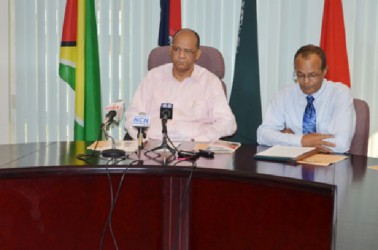Minister of Home Affairs, Clement Rohee yesterday restated the government’s zero-tolerance policy on all drugs that are deemed illicit, including marijuana, according to GINA
His statement follows a news item in yesterday’s Stabroek News which raised the question as to whether there was any prospect of decriminalizing marijuana for recreational, medical and religious uses. In that news item, Attorney General Anil Nandlall said that he knows “of strong views held by large groupings within our country both for and against the decriminalisation question.” He said that perhaps the time has come for the country to begin a national conversation on the matter and for public consultations to be held.
According to the Attorney General, in terms of the revision of the penalty for the possession of marijuana which currently obtain, “again,

this had been the subject of ongoing debate”.
He reminded this newspaper of the changes that were made to the law to allow for persons with small quantities not to suffer imprisonment as a mandatory sanction as it was before.
He said that the magistrate has the discretion to decide whether to impose a fine or imprisonment if the quantity is of a particular size. “Perhaps the time has come for us to revisit this aspect of our law again, especially in light of the changes taking place internationally,” he said.
Rohee’s position on drugs was delivered yesterday at the launch of the National Drug Report for 2012, compiled by the Task Force on Narcotic Drugs and Illicit Weapons, at his Brickdam Office.
This report is produced annually by the Ministry of Home Affairs through support from the Task Force, the Customs Anti-Narcotic Unit (CANU), the Narcotic Branch of the Guyana Police Force, the Guyana Revenue Authority (GRA) and the Financial Intelligence Unit.
GINA said it highlights the actions taken by the Government through the various agencies, to restrict both the demand and supply of drugs. Critics have argued that these drug reports mean little in an environment when the law enforcement agencies were catching only the small fish but not the drug lords.
Rohee said, according to GINA, that the constant fight against the drug trade is taken for granted, and due recognition is not given to the relevant agencies in the security sector who continue to wage the battle against the drug cartels. He lauded all the operatives from the various agencies, and the task force for coordinating and combining those efforts.
Coordinator of the Task Force, Major General (rtd), Michael Atherly said that apart from being a major public health concern, illicit narcotics are key generators of crime, including domestic abuse, theft, driving under the influence, other violent crimes, and money laundering, GINA said.
GINA said that according to the report, cannabis and cocaine continue to be the two main types of illicit drugs being trafficked and consumed locally, based on the seizures. During 2012, CANU made seizures amounting to 103 kilogrammes and 660g of cocaine (with a value of $93,600,000) and 111kg and 564g of cannabis (with a value of $20,160,000). The GRA’s enforcement unit seized 561kg and 780g of cocaine ($504,900,000).




